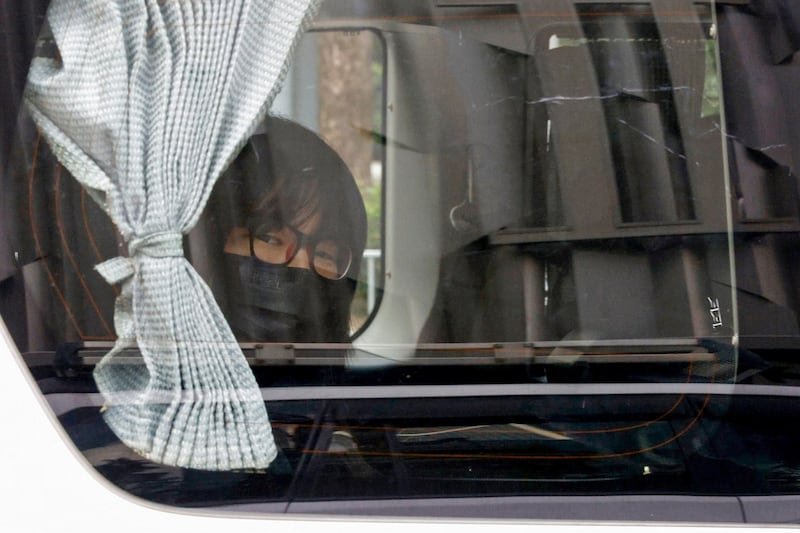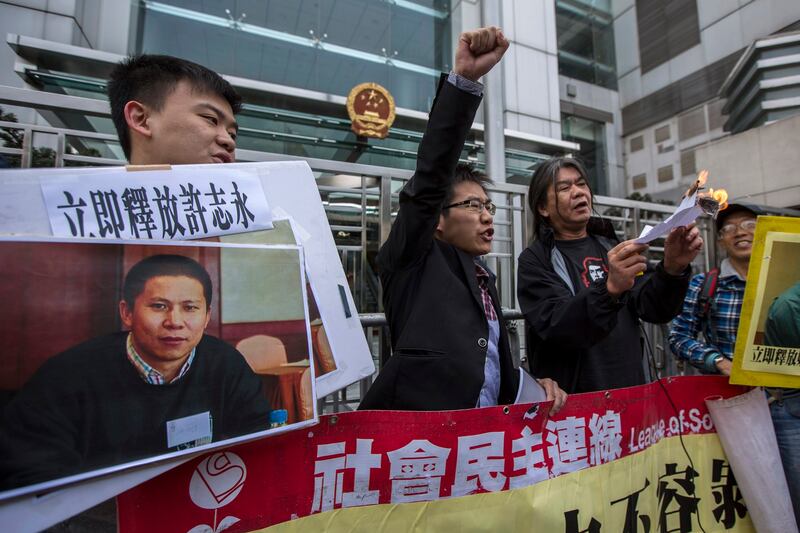Three jailed attorneys from Hong Kong and China have been honored with Council of Bars and Law Societies of Europe human rights awards, as a Chinese court rejected appeals from two of them, upholding their original sentences for "subversion."
Jailed Hong Kong barrister Chow Hang-tung, who has been behind bars since September 2021, and Chinese rights attorneys Xu Zhiyong and Ding Jiaxi, who were jailed in April for attending a 2019 gathering of dissidents in the southeastern city of Xiamen, were given the awards in absentia in recognition of their work upholding human rights, the association said on its website.
The awards were to honor "the long-standing and outstanding commitment and sacrifice those three lawyers have demonstrated in upholding the fundamental values of the legal profession and in defending and advocating for human rights and the respect for the rule of law," it said.
The ceremony in Athens took place on Friday, the same day that a court in the eastern province of Shandong rejected appeals from Ding and Xu, who are currently serving 12- and 14-year jail terms handed down by the Linshu County People's Court for "subversion of state power," respectively.
Ding's wife Luo Shengchun said both men had been barred from meeting with their lawyers, who weren't allowed to enter the court building before the results of the appeal were announced.
"They did everything to prevent the lawyers from meeting with them, saying the system was down," Luo said. "They were under heavy guard [for the hearing]."

"The lawyers weren't allowed to publicize the appeal verdict," she said. "These people are more like gangsters than policemen and judges."
"All Ding Jiaxi wanted to do was be a lawyer, but now all he can do is sit in prison, and be locked up for such a long time," Luo said.
"All they can do in prison is use their own bodies, like the Tank Man who stood in front of those tanks just before June 4, 1989," she said in a reference to the iconic news photo taken shortly before the Tiananmen massacre.
"If they want to oppose this totalitarian dictatorship, they have no choice but to go to jail," she said.
‘Dignity of the law’
Chow said in an acceptance speech sent from prison that the fight for democracy in China is part of ensuring that the law serves democratic and humanitarian values, rather than just the wishes of those willing to use force to bring others in law.
"The dignity of our profession ... it is bound up with the dignity of the law, with whether the law reflects our autonomy or denies it," wrote Chow, who organized now-banned annual vigils commemorating the 1989 Tiananmen massacre.
"In that sense the building of democratic institutions that alone can safeguard the law’s dignity is also a lawyer’s duty, which is why all three of us receiving this prize today are jailed for working for democracy in China, a fight that may seem unrelated to our profession but is in fact, central to it," said Chow.
She is currently awaiting trial under a security law on charges of "subversion" amid an ongoing crackdown on dissent in Hong Kong.
"It is a fight we cannot waver from, even when knowing that the laws we served would likely condemn us," she said, describing the fight as "the highest service a lawyer can offer her fellow men."
Little difference
Rights activist Patrick Poon said the fact that Chow was honored alongside Xu and Ding shows how little difference there is now between the judicial systems in Hong Kong and mainland China, following a years-long crackdown on political opposition and public dissent in the wake of the 2019 protest movement.
"It's very clear that things in Hong Kong are exactly the same as in mainland China, which is a judicial system within a totalitarian system," he said. "Chow [and other defendants] are faced with a country like China, which has no concept of the rule of law at all."
"If the Chinese government thinks you are inciting subversion, then you're inciting subversion," he said. "If they want you in jail, then you have to go to jail."
"It is fundamentally lawless," Poon said.
Chow has been held at Hong Kong's Tai Lam Centre for Women since Sept. 8, 2021, on charges brought against her in four different cases. All were for completely peaceful acts and related to the work of the Hong Kong Alliance in Support of Patriotic Democratic Movements of China or commemoration of the June 4 Tiananmen massacre, the Council of Bars and Law Societies of Europe said.
"She has worked in both China’s and Hong Kong’s legal systems to promote democracy and protect fundamental rights ... [and faces] a sentence of 10 years of imprisonment for “inciting subversion” with no guarantee of a fair trial, as well as to be disbarred by the Hong Kong Bar Association," it said, adding that the award was in part an attempt at "increasing her visibility" to mitigate the authorities' retaliation against her.

It said Xu Zhiyong first came to prominence in 2003 when he and two other legal academics took up the case of a university student who was beaten to death in Guangzhou and advocated for abolishing China's detention and repatriation system.
"This campaigning led the Chinese government to abolish a system in which rural migrants were arbitrarily detained, fined and expelled by police in big cities," the association said.
"Xu has been a prolific essayist writing on issues including access to fair education, governmental mistreatment and repatriation of migrant workers, corruption and wasteful government spending," it said.
Ding and Xu founded the New Citizens' Movement in 2010 to campaign for constitutional reform and a more transparent system of government, "rooted in democratic ideals of freedom and societal responsibility," it said.
Both have previously served time in prison after being detained in 2013 on public order charges after they called in public for China's leaders to declare their assets and those of their families.
Translated by Luisetta Mudie. Edited by Malcolm Foster.
